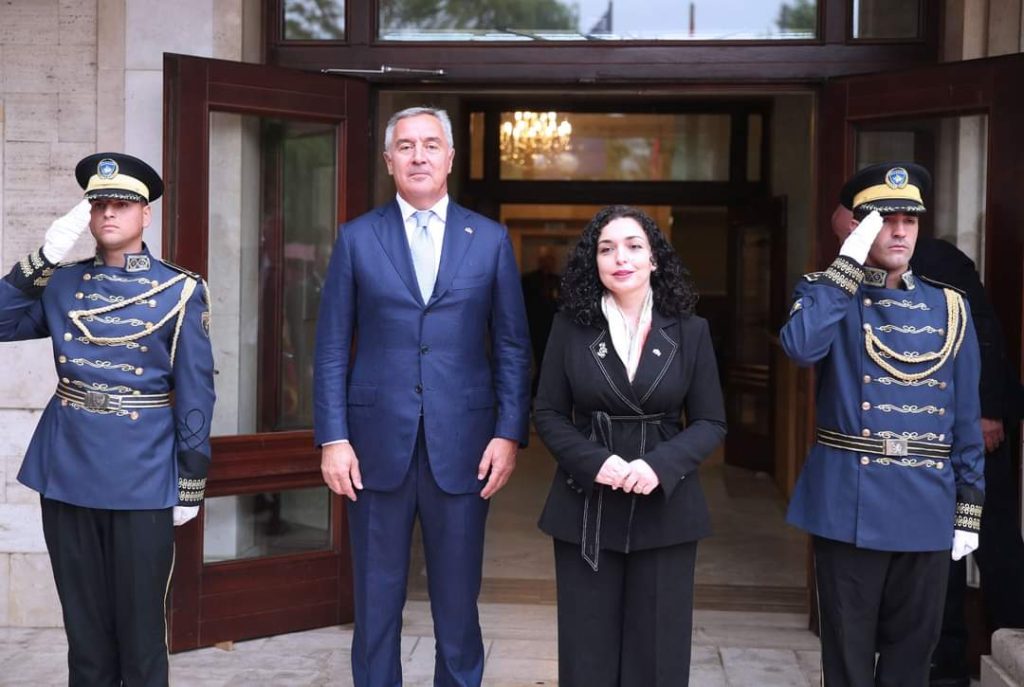
Please Follow us on Gab, Minds, Telegram, Rumble, Gab TV, GETTR
The presidents of Kosovo and Montenegro have reiterated their opposition to the Open Balkan, triggering a response by the Albanian Prime Minister who promised the initiative won’t stop.
President Milo Djukanovic of Montenegro and his host in Kosovo, President Vjosa Osmani, said the Open Balkan initiative could potentially lead to increased Russian influence in the region through its ally Serbia, and slow down the region’s accession into the EU.
The Open Balkan is an initiative launched in October 2019 by the leaders of Serbia, Albania and North Macedonia. It aimed to establish an area without barriers to the movement of goods, people, services and capital.
Kosovo, Montenegro and Bosnia and Herzegovina, however, have refused to join, essentially arguing that the new initiative is redundant as it mimics in poor terms a more robust initiative under the Berlin Process, and that it would only keep each country and the whole region away from the EU.
In a joint press conference with Djukanovic on Wednesday, Osmani told journalists that that the last months have proved there is potential for Russian to increase its influence in the region, hinting at Serbia’s refusal to align its foreign policy to that of the EU with regards to Russia.
“Instead of accelerating the progress of our countries towards the EU, it would put them in a waiting room and consequently prolong the integration process even more. Therefore, we as Kosovo continue to hold the same position that we see regional cooperation as key, but we will develop it within the already existing initiatives, where Kosovo is a member, and in particular towards the Berlin Process “, she said.
Djukanovic added that the Open Balkan was launched at a” moment of depression” due to German Chancellor Angela Merkel’s expected departure and the EU refusal to advance the Balkan countries’ accession bids.
“They thought that European integration was impossible, and that perhaps with the departure of Chancellor Merkel, European integration for the Western Balkans is fading. But this is not correct and what is happening has created a good momentum for further integration for the Western Balkans,” he said, in relation to the effects of the Russian invasion of Ukraine.
However, the new Montenegrin Prime Minister Dritan Abazovic, whose minority government depends on Djukanovic’s party support, has expressed public support for the Open Balkan, while his Albanian counterpart has hinted that Abazovic could soon make his country the fourth member of the Open Balkan.
Djukanovic has stated earlier that this is a divisive issue between him and Abazovic, stressing that the initiative takes the focus off the EU integration toward which the minority government was mandated to lead the country.
In an interview for Kosovo’ Koha TV last week, Djukanovic said the Open Balkan would help Serbia to advance its nationalist claims on its neighbors’ territory, meaning Montenegro, Kosovo and Bosnia and Herzegovina. He specifically aimed at Serbian President Aleksandar Vucic’s low credibility as initiator due to his work as minister of propaganda in the genocidal Serbian regime of Slobodan Milosevic.
In 2016, Djukanovic allegedly survived a coup plot carried out by Russian secret service in cooperation with Montenegro’s opposition Serbian parties.
Djukanovic and Osmani’s opposition triggered once again a response by Albanian Prime Minister Edi Rama, who in the recent past has been the strongest supporter of Serbia among international leaders in relation to its refusal to align itself with the EU, as well as refusal to impose sanctions on Russia.
Rama said that those who oppose the Open Balkan are unable to understand that his initiative fosters peace and EU integration.
“Whoever is against the Open Balkan is within their right not to see, hear or understand that this initiative fosters peace, cooperation, integration and accelerates the Berlin Process. Open Balkan won’t stop because the future can’t be stopped,” he vowed.
On Wednesday, Prime Minister Albin Kurti also reiterated Kosovo’s opposition, stressing that Serbia cannot claim an “open Balkan” while refusing to recognize Kosovo.
“Serbia is not open to Kosovo, it does not recognise our documents. If they want the Balkans to be open, they must be open to Kosovo. The Open Balkans is open to something that Serbia is open to, but Serbia is not open to Kosovo. The Open Balkans was born in October 2019, when my party won the elections for the first time and when it became clear that the EU would not open [accession] negotiations for Albania and North Macedonia. The Serbian president took advantage of the grief of Albania and Macedonia at that time,” he said.
Under the Berlin Process launched by Chancellor Merkel in 2014, all six Western Balkan countries have already agreed to the Common Regional Market—a way more robust and inclusive initiative of the objective set by Open Balkan, featuring also a a detailed broad action plan that has been under implementation since 2020. As part of this action plan, roaming tariffs were removed in 2021 across the region.
In contrast to this, the Open Balkan’s achievement in three years has been to enable the movement of Albanians and Serbs in respective countries by using only their IDs.
Moreover, neither Rama nor Vucic has ever explained what substantial difference exists within their initiative to justify’s its existence besides the Common Regional Market.
From the information made public, compared to the Common Regional Market, the Open Balkan brings nothing new and is just a fraction of what the CRM represents. The initiative has no clear policy paper or action plan, it is opposed by half of the members targeted, and—most importantly—it lacks any EU involvement.
European leaders have avoided mentioning Rama and Vucic’s initiative so far, with Chancellor Scholz vowing to give fresh push to the Common Regional Market this year.

